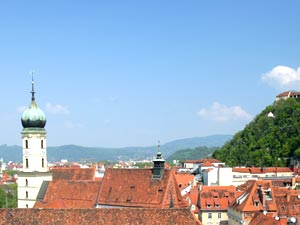
City of Graz
Waste management situation in Graz:
Graz has about 270,000 main residences and 30,000 second residences. The area is about 128 square kilometres with 40% green spaces. There are 57,000 buildings with 110,000 households. The waste separation system in the city of Graz is well established. The separated waste collection started more than 25 years ago.
On more than 34,000 sites in Graz (properties, households and public collection centers) the waste containers are positioned. For the following waste-fractions different waste containers are foreseen: residual waste, paper, light packaging, organic waste, glass and metal. Textiles, bulky waste, hazardous waste, building rubble, waste oils etc. can be disposed at special collection centers. The collection of bio-waste started in 1992 and the yearly collected amount of bio-waste per inhabitant constantly increased to about 145 kg/year in 2012. It contains compostable municipal solid waste, like kitchen waste, garden rubbish, tree cut, waste resulted from food market and cemetery waste. More than 90% of the population of Graz use the separated organic waste collection (“Biotonne” in German). Only 8% of the households are composting their organic waste themselves. These ones get a reduced price for the waste disposal but they have to make sure that they really compost their organic waste and they are also controlled.
At the moment separate collected organic waste from households and green waste (waste from gardening and landscape maintenance) are mixed and pre-treated at the organic waste treatment plant Sturzgasse Graz and then treated in the composting plant nearby Graz (bio-mechanical organic waste treatment plant). Unfortunately, the energy content of the organic waste is not used at the moment (as the material is only composted). However, landfill gas from the existing landfill site is used in two CHP plants for electricity and heat generation.
The waste separation by the population in Graz is quite good compared with the Austrian average. Concerning the percentage of the separated collected organic fraction in the municipal solid waste Graz is with 21% two percentage points above the Austrian average. An evaluation of the remaining residual waste figured out, that with the remaining organic fraction in this residual waste and optimal waste separation behaviour this percentage could theoretically be increased to about 30 to 34%.
The population is quite satisfied with the existing waste separation system, there are only few people not accepting the system. As already mentioned there is a potential for optimisation and so there are special trainings for different target groups organised by the city of Graz/department of environment. These are especially for:
- Citizens in residential areas
- Migrants
- Children in kindergarten’s and primary schools
- Companies with high amounts of residual waste and bio-waste like restaurants, food markets, etc.
Status WtB plant Graz:
The estimated potential of organic waste, which could be utilized in the potential WtB-plant Graz, accounts for approximately 48.000 t/a and consists of about 70% organic waste from the brown organic waste bins and the remaining part comes from food waste from restaurants caterings and the food industry, expired food from supermarkets and suppliers and old bread from bakeries. About 70% of the organic waste arises directly in Graz and the rest comes from its surrounding districts.
For the WtB-plant in Graz a wet fermentation process is foreseen. With the above mentioned substrates about 6 Mio. Nm³ biogas can be produced per year. After upgrading to biomethane about 3.6 Mio Nm³ biomethane would be available per year. A connection to the natural gas grid is foreseen. The following use for biomethane is planned in Graz:
- For public transport in Graz (busses, taxi, etc.)
- For the fleet of the waste collecting trucks, the company cars of the involved companies/stakeholders and in general for corporate fleets
- Product “Naturgas” for industry and households – “green gas” and attractive feed-in tariffs for green electricity when CHP-systems are operated with this fuel
The stakeholders of the WtB project of the city of Graz are the City of Graz/Holding Graz, the local energy supplier and gas provider Energie Steiermark and local waste disposal company/companies. It is foreseen, that the biomethane should be shared between these partners.
The decision about the location for the WtB-plant figured out as one of the most critical and challenging ones. After several evaluations of different potential plant-locations, a municipality was found at the end of 2013/ beginning of 2014, which is interested in the WtB project of the city of Graz. Negotiations about the land site started. For Q3/Q4 2014 the start for the detailed planning for the WtB-plant is scheduled.
With the UrbanBiogas-project it was possible to assist the process towards the realisation of the WtB-plant in Graz significantly. A consortium between the stakeholders was founded and the players in this consortium are highly interested in the realisation of the WtB-concept in Graz. Additionally the publicity of the product biomethane was increased through several info-events, meetings and workshops within the UrbanBiogas project and cooperation’s with other cities started which are interested in such a WtB-concept.
Reports about Graz
- Municipal waste management in Graz EN
- Biogas & Biomethane Production in Graz EN
- Biomethane use for cities: grid injection & transport in Graz (Austria) EN
- Economic Feasibility of WtB Concepts for Valmiera, Zagreb and Graz EN
- Report on the national expert consultation meetings on biomethane use in Graz EN
- Report on competition event for biogas plant companies – 04./05.12.2013 St. Pölten EN
- Summary report on promotion of sustainable waste management in Graz EN
- Report on the results of the survey and the public consultation in Graz EN
- Biomethannutzung: Netzeinspeiszung und Transport in Graz (Österreich)/ Biomethane use for cities: grid injection & transport in Graz (Austria) EN, DE
- Biogas und Biomethan Produktion in Graz / Biogas & Biomethane Production in Graz EN, DE
- Städtische Abfallwirtschaft in Graz / Municipal waste management in Graz EN, DE
 |
Graz Energy Agency Contact: Ernst Meissner |








